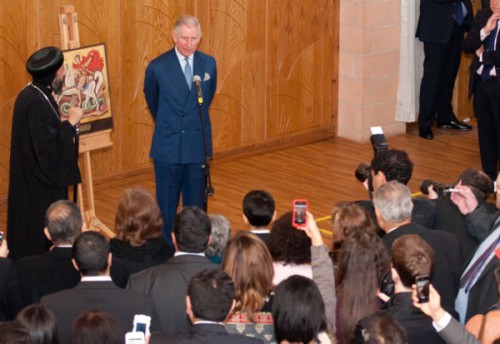18th December 2013
Christians in the Middle East: A Royal and Government Response

The Religious Freedom Project of the Berkley Center for Religion, Peace and World Affairs at Georgetown University organised an important conference in Rome last week on the theme of ‘Christianity and Freedom’. A number of distinguished British academics took part. One of the questions asked was what more are governments doing to stop religious persecution wherever it happens, including in the current context of war in the Middle East.
During a debate in the House of Commons on 3 December on the issue, the Foreign Office Minister Mark Simmonds said that: “the Foreign and Commonwealth Office recognises and prioritises this matter not just as a problem, but as an issue on which we must work to find solutions”. He said that we were working to ensure that those responsible for such crimes would be held to account. And he added: “When Christians are persecuted, we, as Government Ministers, speak out clearly and forcefully. I cannot stress enough how seriously the Foreign and Commonwealth Office takes this issue, as part of our commitment to freedom of religion around the world”.
This was illustrated by a speech Baroness Warsi, Senior Minister of State at the Foreign Office and Minister for Faith, given at Georgetown University in November, in which she set out with absolute clarity why governments – including the British government – should be doing more, and what we can do.
One aspect of supporting Christian communities under persecution is to be seen visibly at their side. This His Royal Highness The Prince of Wales did on Tuesday 17 December, when alongside Prince Ghazi bin Muhammed of Jordan he visited the Coptic and Syrian Orthodox communities in the United Kingdom, and later gave a reception at Clarence House for them and representatives of other Christian communities present in the Middle East. In his speech at the reception, His Royal Highness reminded the gathering that: “Christianity was, literally, born in the Middle East and we must not forget our Middle Eastern brothers and sisters in Christ”. Reminding the audience of his role as a bridge builder between Islam and Christianity over many years, The Prince of Wales argued that: “Now … is the time to re-double our combined efforts to stress what binds the three Abrahamic faiths together and, as Christians, Jews and Muslims, to express outrage at what tears us asunder”.
Pope Francis talks of the “scandal” of what is happening to too many Christians around the world. The Prince of Wales expresses “outrage”. My government will continue to do what it can to ensure that we react forcefully to all forms of persecution, work to improve the relations between faiths, and recognise clearly and publicly the positive role Christians play across the world.
